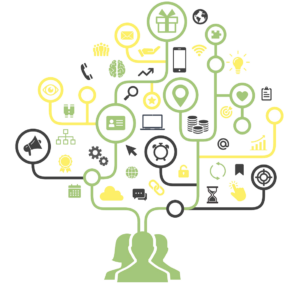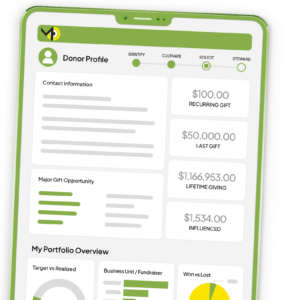Understanding and using your data is essential to fundraise and retain donors successfully. That may seem impossible with the amount of information you are juggling. From donations to members and volunteers, there are so many factors to consider. A nonprofit CRM helps you keep track of your information and use it to your organization’s advantage.
In this guide, we will review everything you need to know about the best CRMs for nonprofit organizations and explore which platforms to consider. Here’s what you can expect:
- What is a nonprofit CRM?
- What features make the best CRM for nonprofit organizations?
- 7 best CRMs for nonprofit organizations
What is a nonprofit CRM?
Constituent Relationship Management (CRM) system is a business application which acts as a central source of truth for your organization bringing data from a range of channels into one place. The idea behind a nonprofit CRM is to effectively manage your relationships with constituents, whether they are volunteers, donors, or members, to increase engagement and retention. A nonprofit CRM does these three key things:

Easily Manage Data
CRMs are the central data hub for nonprofit organizations. They contain information about donors, members, volunteers and supporters. This information is organized and structured in an accessible manner so that you can easily act on data relevant to your goals.
Reporting and data analytics capabilities help nonprofits extract meaningful insights from your data, guiding strategic decision-making and ensuring you maximize the potential of your constituent relationships. CRMs for nonprofits not only manage data efficiently but also transform it into actionable intelligence, empowering nonprofits to achieve their missions more effectively.
Foster Fundraising
CRMs provide a system allowing easy donation, fundraising events and grants and awards tracking and processing. They provide a suite of tools designed to streamline the entire fundraising process. From donor management and engagement tracking to campaign management and reporting, CRMs offer a centralized home to plan, execute and measure the success of your fundraising efforts.
Constituent Management & Retention
A CRM is a valuable tool for managing constituents and retaining donors. Your CRM will contain donor profiles and the giving history of each donor, allowing you to understand and make informed decisions based on your donor’s history. You can also manage those relationships within your CRM and send donor communications, including marketing campaigns and social media posts.
Often, CRMs are used for businesses; however, there is a rise in CRMs suited for the needs of nonprofits.
What features make the best CRM for nonprofit organizations?
There are many CRMs out there, and it can be challenging to determine which is best for your organization. These are some key features of CRMs which benefit nonprofit organizations.

Customizable Dashboard
A CRM will provide an overview of your data to give an at-a-glance view of essential data and insights relevant to the organization. It allows users to access real-time information such as donor engagement, fundraising progress, membership growth and more, all in one place. They can customize widgets and visualizations based on their goals and priorities. This will help prioritize and make informed decisions toward goals. This level of personalization and accessibility empowers nonprofits to manage their operations effectively and optimize strategies for donor engagement, fundraising and program impact.
Constituent Profiles
Your constituent profiles are the foundation of your CRM system. These profiles provide a snapshot of each supporter, their contact information, engagement history, giving patterns and communication preferences. Constituent profiles constantly evolve, and the more information you gather, the more valuable they become. This is why it is so important to have up-to-date information accessible for each constituent to personalize your outreach efforts, tailor fundraising appeals and track the progress of each relationship. Your constituent profiles also allow you to analyze your data and make data-driven decisions to foster stronger relationships with your constituents.
Integrated Gift Processing
Integrated gift processing streamlines the donation management process by integrating various payment gateways and financial systems. This functionality simplifies the collection and processing of contributions, whether donations or grants. This allows for real-time tracking of donations. You can also automate replies and thank you messages to remove the administrative burden.
Moves Management
A moves management feature allows nonprofits to focus on cultivating strong relationships with constituents. It provides a framework for strategically moving them through various stages of engagement, from identification and cultivation to stewardship. A CRM that provides moves management is essential for nonprofits to track and document each interaction taken with constituents, set goals and timelines for cultivation and assign tasks to team members. This feature ensures that donors receive personalized and meaningful engagement, enhancing the likelihood of successful fundraising efforts and fostering long-term donor relationships, ultimately supporting your mission and sustainability.
Marketing
Your nonprofit CRM should include marketing tools or the ability to integrate with marketing solutions.
Things to look for:
- Easy integration: your CRM should easily integrate with trusted marketing systems, allowing you interoperability from the get-go.
- Personalization features: people engage with information they can relate to. Your CRM will collect valuable demographic information about your constituents and ensure you can use this information in personalized communications and marketing campaigns. This will help you build stronger relationships with your constituents.
See 5 Reasons a CRM is an essential tool in marketing for non-profit organizations.
Integrations
Your CRM should work as you need it to, often involving integrations with other trusted software. Most organizations use Microsoft 365 for internal collaboration, so why not integrate your CRM with a platform your team already uses?
Some key Microsoft integrations are:
- Dynamics 365 Business Central & MISSION ERP
- Microsoft Cloud for Nonprofit, including the Likelihood to Give AI Model
- Dynamics 365 Marketing (now known as Dynamics 365 Customer Insights)
- Microsoft Volunteer Management & Engagement
Top 7 Nonprofit CRMs
Now, let’s review what options are available to you.
1.MISSION CRM
Yes, that’s us; however, we genuinely believe we are the best option for midsize to enterprise nonprofits. We have spent much time working with nonprofits to get our CRM right for your needs. MISSION CRM is the first and only donor management and fundraising system built on Microsoft Cloud for Nonprofit and the Nonprofit Common Data Model.
This nonprofit CRM is built on Microsoft for Nonprofit, meaning that it fully integrates with your Microsoft ecosystem. This allows you to collaborate with your team and work together to achieve your goals. Find a centralized home for all donor management and fundraising operations. A 360 view of donors is updated in real-time so that you are always working with the most recent data. This cloud-based system, which harnesses the power of Dynamics 365 and Azure, delivers an enterprise-grade system which includes the following:
- Donor management
- Gift processing
- Opportunity management
- Membership management
- Online fundraising engagement
- Event management
To elevate your donor management and fundraising, book a demo with the MISSION CRM team.
2. Salesforce Nonprofit Cloud
Salesforce Nonprofit Cloud is used by nonprofits and other businesses as a CRM. Nonprofits can configure the software to track and manage donations by downloading the Nonprofit Success Pack.
Features of Salesforce CRM include:
- Custom Donor Profiles
- Reports and dashboards
- Program Management features
Salesforce Nonprofit Cloud is built to help businesses thrive and grow; however, it is essential to remember that the additional customizations (Nonprofit Success Pack) required to make Salesforce work for your nonprofit will take time and add an increased monthly or yearly cost. Alternative CRMs that are built for nonprofits specifically will help you seamlessly integrate a CRM into your workflow.
3. Bloomerang
Bloomerang is a nonprofit CRM designed to help organizations manage and track their donors and volunteers.
Some of their features include:
- Customizable donor profiles
- Reporting
- Integrations with Mailchimp, TrueGivers, and DonorSearch
Bloomerang is great for smaller or new nonprofits looking to start somewhere; however, it may not be the right fit if you are looking to grow. Larger nonprofits will find a solution that can easily grow with their organization more beneficial.
4. DonorPerfect
DonorPerfect is a CRM built for nonprofits looking to engage with donors. They offer support and services in both English and French.
Some key features include:
Donor dashboard
Gift processing
Monthly giving program
Their website includes their full features list.
5. Charity Engine
CharityEngine is a donor-based CRM that provides a complete view of their profiles.
Their key features include:
- All-in-one capabilities
- Large-scale email and marketing
- Payment processing
Visit their site to view their full list of features.
6. Neon One
Neon CRM is designed for small and mid-sized nonprofits to help manage all of their data in one place. They focus on building relationships with constituents.
Some key features include:
- Donor Database
- Engagement Timeline
- User Centric Dashboard
Check out their full list of features.
7. Blackbaud Raiser’s Edge
We could not leave out this last one, mainly because it is a name that is familiar to many nonprofits. Blackbaud offers 2 CRM options: Blackbaud CRM for enterprise organizations and Raiser’s Edge NXT for mid-sized organizations.
Their features include:
- Analytics and Reporting
- Data-rich view of donors and prospects
- Built-in Email campaign abilities
Blackbaud is the choice of many nonprofits because they were one of the original CRM available in the 1980’s. However, a lot has changed in the past few years, and many newer, updated CRMs offer more. From updated integrations to customizations, other CRMs have kept up with the diversified fundraising of nonprofits. If you want more, read our article: Moving on From Raiser’s Edge.
Choosing the right CRM for your organization will help you make the most of your system for your specific needs and goals. Each CRM has their own features and benefits, so it is important to choose the one that meets your needs.
MISSION CRM is built on Microsoft to provide midsize to enterprise-level nonprofits with the data they need to grow and succeed. If you are interested in a demo, contact MISSION CRM to see how we can help.
